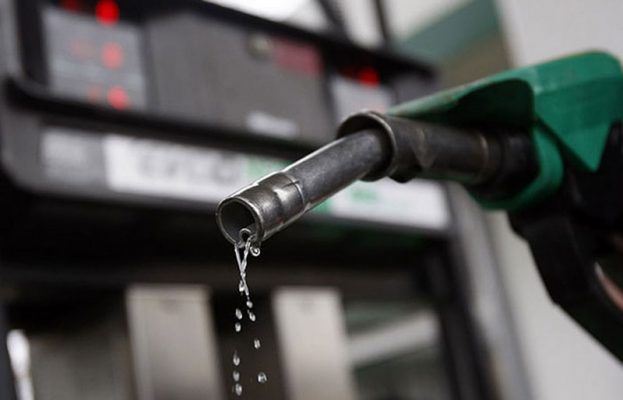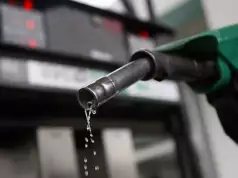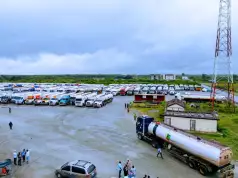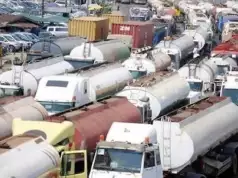The landing cost of imported petrol fell to N853 per litre on Tuesday, amid a continuing price war between participants in the country’s downstream oil industry.
This comes as marketers secured regulatory approval to import 117,000 metric tonnes—equivalent to 156.897 million litres—of petrol within eight days, from April 8 to 16, 2025, to boost fuel supply nationwide.
These figures were revealed in separate documents obtained by our correspondent from the Nigerian Port Authority and the Major Energies Marketers Association of Nigeria.
Last week, Nigerians heaved a sigh of relief after the Dangote refinery resumed sales of its refined petroleum products in naira and slashed its loading cost to N865 per litre. The relief was evident after its initial suspension of the sales of petroleum products increased the pump price to almost N1,000.
But a new drop looks imminent as the latest Competency Centre daily energy data showed that the landing cost has reduced to N853 per litre, N12 lower than the price offered by the 650,000-capacity refinery in Lagos.
Dealers said the N853 per litre on-spot estimated import parity into tanks, which factors in various expenses including shipping, import duties, and exchange rates, is a considerable reduction of N3 from the N856.75 per litre landing cost last week Monday and N852.02 on Tuesday.
The document showed that on-the-spot sales at the NPSC-NOJ terminal dropped to N853.12 per litre, while the average cost for 30 days also dropped to N844.84 per litre.
The document also noted that the price of Brent crude was benchmarked at $64.76 per barrel, from $62.82 per barrel quoted on Tuesday, with an exchange rate of N1,603.78 per dollar. This price was calculated based on 38,000 metric tonnes by the marketers.
It further noted that the refinery priced its PMS coastal price at $682.75 per metric tonne, its gantry price at N926.58 per litre and its coastal price at $603.50 per MT for AGO.
It read, “International petroleum product prices declined after President Trump announced new tariffs on Chinese goods, triggering concerns about the global economy and weaker fuel demand. Despite initial fears of supply disruption, the market reacted harshly due to oversupply and slowing industrial activity.
“However, prices began to recover slightly when President Trump later paused some of the tariffs, easing trade tensions and boosting market sentiment. Overall, this highlights how demand-side concerns are increasingly outweighing supply risks in shaping oil market dynamics.
“Dangote Refinery reduced its petrol ex-depot price to N865 per litre during the week, intensifying competition in Nigeria’s downstream oil sector. The foreign exchange rate continues to exhibit significant volatility, with the Naira experiencing renewed depreciation, thereby further delaying imports.
“Nevertheless, as landing costs are directly tied to these variables, they are expected to fluctuate several times intra-day. Cost savings can be achieved through optimising supply chain management by securing long-term contracts at favourable rates and leveraging economies of scale to streamline inland distribution networks.”
Meanwhile, an analysis of the NPA document revealing details of each import showed that the commodities landed at the Tincan port in Lagos and the Calabar port in Cross River State.
The first shipment carrying 21,000 metric tonnes of PMS allocated to the Peak Shipping Agency berthed at the KLT Phase 3A terminal on Tuesday, April 8, 2025, at midnight.
This was followed by the arrival of a 20,000 metric-tonne SL Aremu vessel on Wednesday, April 10, at midnight. It berthed at the KLT Phase 3A terminal and was handled by the Tiger shipping maritime agent.
Similarly, a Fatima Sarah ship handled by Dozzy Oil and Gas berthed at the Calabar port in Cross Rivers carrying 15,000 metric tonnes of imported petrol on Saturday, April 12, at 09:25pm.
On Monday, April 14, at 3:20 pm, another vessel carrying 20,000 metric tonnes of fuel berthed at the Tincan port. It was assigned to Peejay Shipping as its agent.
Also, two vessels carrying a combined sum of 41,000 metric tonnes of fuel are scheduled to berth at midnight on Tuesday and Wednesday, April 15 and 16, respectively. This shipment will arrive at the KLT Phase 2.
This means the six vessels brought in 117,000 metric tonnes.
Going by the conversion rate of 1,341 litres to one metric tonne, it, therefore, implies that the marketers are bringing in about 156.897 million litres of petrol at an average of 19m.





![Late Chinyere Gladys Mbakwe Set For Burial Feb. 20 In Umuahia [SEE POSTER] Mrs. Chinyere Gladys Maduabuchi Mbakwe Set For Burial Feb. 20 In Umuahia [SEE POSTER]](https://abntv.com.ng/wp-content/uploads/2026/02/FB_IMG_1771516412563-300x194.jpg)




![Late Chinyere Gladys Mbakwe Set For Burial Feb. 20 In Umuahia [SEE POSTER] Mrs. Chinyere Gladys Maduabuchi Mbakwe Set For Burial Feb. 20 In Umuahia [SEE POSTER]](https://abntv.com.ng/wp-content/uploads/2026/02/FB_IMG_1771516412563-100x75.jpg)